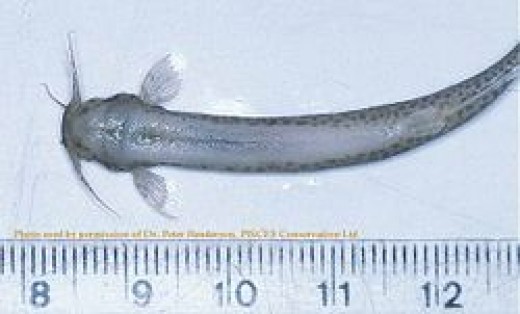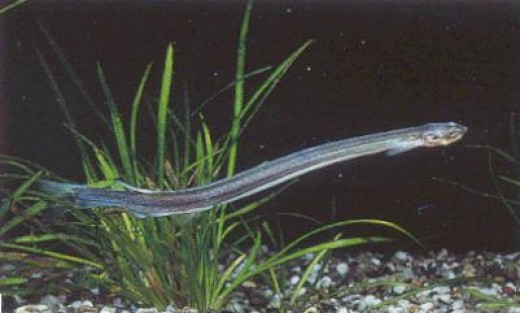The Candiru
Imagine a little offbeat,
out of the grid fun along the Amazon River. Sort of like Bobby Kennedy
Jr., and the late J.F.K.'s best friend, K.L. Billings, or "Lem
Billings" had at one point during the R.F.K. children's most drugged out
years. You wade into the river to cool down, and soon emerge with a
near paralyzing pain in your groin. You'd clearly forgotten about The
Candiru.
It's been said even that The Candiru can swim upstream, indeed, up a stream of urine, and into the urethra, and there it will make it's parasitic home. But whether or not these things are realistic, or just "Naked Lunch" style folklore isn't really up for debate any more. What is debatable is just how widespread or how often or likely such a horrific situation could be considered a legitimate worry. No, the Candiru can not defy the laws of physics, but it's ability to destroy delicate human organs, and to use humans as it's "host" for parasitic activities is a fear based not in myth, but reality.
It's been said even that The Candiru can swim upstream, indeed, up a stream of urine, and into the urethra, and there it will make it's parasitic home. But whether or not these things are realistic, or just "Naked Lunch" style folklore isn't really up for debate any more. What is debatable is just how widespread or how often or likely such a horrific situation could be considered a legitimate worry. No, the Candiru can not defy the laws of physics, but it's ability to destroy delicate human organs, and to use humans as it's "host" for parasitic activities is a fear based not in myth, but reality.
The Candiru, A Small South American Species Of Catfish


Source
The Candiru
Most
common near the junction of the Rio Negro and the Amazon rivers, the
near translucent bodies of these small fish make them very had to spot.
Despite it's very diminutive size, The Candiru is the most feared fish
in the Amazon - even when stacked up against many another larger, and
more physically intimidating River Monster.
There are over three thousand species of Catfish, and Catfish inhabit every continent except for Antarctica. Without researching at all, I can't help but imagine a less desirable "catch." Now, one shouldn't think that just because this fish has the proclivity to swim into the human urethra that it doesn't grow large enough for an angler to hook, Wikipedia assures me that they've grown to a size of sixteen inches in length. I can imagine them being eaten as well.
There are over three thousand species of Catfish, and Catfish inhabit every continent except for Antarctica. Without researching at all, I can't help but imagine a less desirable "catch." Now, one shouldn't think that just because this fish has the proclivity to swim into the human urethra that it doesn't grow large enough for an angler to hook, Wikipedia assures me that they've grown to a size of sixteen inches in length. I can imagine them being eaten as well.
The Candiru, The Facts.
Despite
the horror stories, we have facts; and the facts are that the Candiru
horror stories are real, but possibly over exaggerated. In 1829 a German
biologist, C. F. P. Von Martius, reported, but never actually observed
the first damages and horrors visited upon humanity by the tiny Candiru
Catfish. Ligatures and coverings of natives genitalia while entering the
water could have been used for other purposes - protection against
other fish, and other diseases. In 1865 a French naturalist dismissed
the idea of a fish swimming up a stream of urine into a urethra as
preposterous, and against the very laws of physics.
By 1836 eyewitness medical accounts prove that Candiru fish had, in fact, lodged themselves parasitically inside humans through various openings. Amputations were observed, but the local piranha was thought to have been the cause. In 1891, naturalist Paul Le Cointe provides detailed first hand accounts of removing a Candiru specimen from a human first hand.
So there you have it, the William S. Borroughs account is legitimate, but the idea of a small fish swimming upstream in passing urine from a human above and out of the river is, in fact, ridiculous. When visiting the Amazon River, I hope you will be mindful and safe.
By 1836 eyewitness medical accounts prove that Candiru fish had, in fact, lodged themselves parasitically inside humans through various openings. Amputations were observed, but the local piranha was thought to have been the cause. In 1891, naturalist Paul Le Cointe provides detailed first hand accounts of removing a Candiru specimen from a human first hand.
So there you have it, the William S. Borroughs account is legitimate, but the idea of a small fish swimming upstream in passing urine from a human above and out of the river is, in fact, ridiculous. When visiting the Amazon River, I hope you will be mindful and safe.

No comments:
Post a Comment